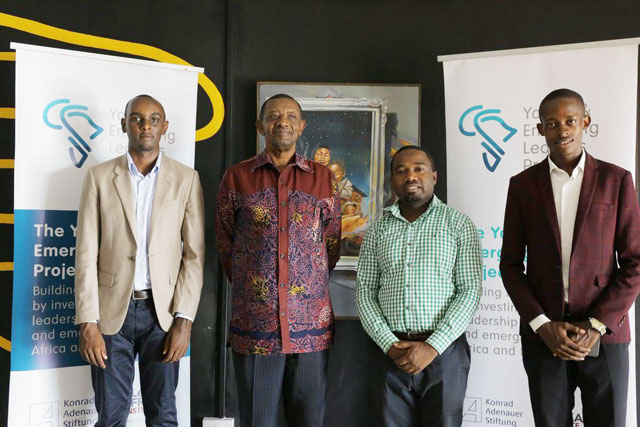
Rwanda’s High Commissioner to Uganda Maj.Gen (rtd) Frank Mugambage has rallied young people to be wary of divisive ideologies like genocide, warning that it’s such that led to the destruction of Rwanda in 1994.
He made the remarks while speaking to over 100 young people from Uganda and Rwanda that converged at the Innovation Village in Ntinda for an event organized by the LeO Africa Institute. It was part of activities to mark the 23rd commemoration of the 1994 Rwandan Genocide against the Tutsi.
The event, organized under the theme; “Taking a Global Stand against Genocide Ideology” and streamed live on new media platforms Facebook and Periscope on twitter on Friday, sought to challenge young people to reflect on the horrific calamity that left over a million Rwandans dead in a space of just 100 days,with a view of raising their(young people)’s consciousness to reject any divisive stratifications and instead become ambassadors for harmonious co-existence.
“Classification is always the first step to any Genocide. Whatever differences that exist among people are exaggerated, with a view of projecting one group as less human than the other as a way of justifying their extermination” Mugambage said, before adding, “You should reject such pseudo classifications!”
He noted that fighting genocide ideology would have to start with the recognition that all human beings were members of the same family, who should thus have a common set of values by which they live.


Re-echoing the Ambassador, Patricia Twasiima, a Human Rights Lawyer and a Program Officer of Chapter Four Uganda noted that young people needed to appreciate that difference per say is not a bad thing, and aspire to create a world in which we can all coexist. “We must do better. We must learn from the mistakes of our forbearers and ensure that such a tragedy is not repeated on our watch,” she said.
Mugambage challenged the youth to be wary of Genocide deniers, arguing that denying the Genocide and distorting the facts around it was a way of evading taking responsibility for their actions. “Those that orchestrated the Genocide know they did something wrong, and are always ready to deny it” he noted.
He noted that 23 years later, Rwanda continues to commemorate the Genocide as a way of honoring the victims and restoring their dignity, arguing that “No matter who we are, every human being deserves to live and die in a dignified manner”
 The Independent Uganda: You get the Truth we Pay the Price
The Independent Uganda: You get the Truth we Pay the Price





